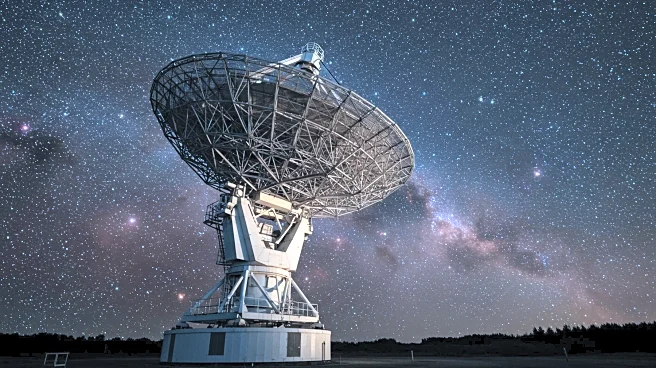What's Happening?
NASA, in collaboration with researchers from Penn State and the Jet Propulsion Laboratory, is intensifying its search for extraterrestrial signals by focusing on specific directions in space. A recent study published in The Astrophysical Journal Letters highlights the analysis of human deep-space transmissions, particularly those directed towards spacecraft near Mars and other planets in the solar system. The study suggests that these signals, which are part of NASA's Deep Space Network (DSN), could potentially be detected by extraterrestrial observers if they align with the transmission paths. The DSN, a system of ground-based facilities, facilitates two-way radio communications with human-made objects in space, sending some of the strongest signals into the cosmos. The research indicates that there is a significant chance for these signals to be intercepted by external observers, especially during planetary alignments.
Why It's Important?
The study's findings have significant implications for the Search for Extraterrestrial Intelligence (SETI). By understanding the patterns and directions of human-made signals, researchers can better strategize the search for alien communications. The potential detection of these signals by extraterrestrial civilizations could provide insights into the existence of intelligent life beyond Earth. This research also underscores the importance of planetary alignments in enhancing the chances of detecting extraterrestrial signals. The ability to detect such signals could revolutionize our understanding of the universe and our place within it, potentially leading to groundbreaking discoveries in the field of astrobiology and space exploration.
What's Next?
Future efforts in the search for extraterrestrial intelligence may focus on monitoring planetary alignments and other strategic points in space to increase the likelihood of detecting alien signals. Researchers may also explore the possibility of using similar technologies to detect signals from exoplanets, expanding the scope of the search beyond our solar system. Continued analysis of the DSN logs and other data sources will be crucial in refining the search strategies and improving the chances of making contact with extraterrestrial civilizations.
Beyond the Headlines
The ethical and philosophical implications of potentially discovering extraterrestrial life are profound. Such a discovery could challenge existing beliefs and prompt a reevaluation of humanity's role in the universe. It also raises questions about how to responsibly communicate with other civilizations and the potential risks involved. The study highlights the need for international collaboration and dialogue on these issues as the search for extraterrestrial intelligence progresses.










